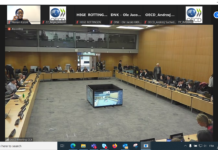A strong EU budget provides the Union with the necessary tools to implement its priorities globally, to rise to the challenges and opportunities and to promote its interests in the world, including through multilateral solutions. Through the new Neighbourhood, Development and International Cooperation Instrument (NDICI) – Global Europe, the new long-term budget will bring a significant modernisation of the external dimension of the EU budget.
It will increase the effectiveness and visibility of the EU’s external policies, strengthen their coordination with internal policies and give the EU the necessary flexibility to provide a faster response to new crises and challenges. This includes helping EU partners to cope with the health and socio-economic impact of COVID-19.
The NDICI-Global Europe earmarks €79.46 billion (in current prices) for cooperation with third countries outside the European Union for 2021-2027 (except for pre-accession beneficiaries and Overseas countries and territories, which are subject to specific instruments), representing a 12% increase compared to the previous long-term budget 2014-2020.
The NDICI-Global Europe will be the EU’s main financing tool to contribute to eradicating poverty and promoting sustainable development, prosperity, peace and stability.
- More funding for EU external action
- Simplified: fewer instruments, and the European Development Fund inside the budget
- Flexibility on a multi-annual basis, to respond to changing circumstances
- Increased transparency and democratic scrutiny
THE PROPOSED INSTRUMENT AT A GLANCE:
1. THE GEOGRAPHIC PILLAR will foster dialogue and cooperation with third countries, with a budget of €60.39 billion.
Each regional envelope will be adapted to the needs and priorities of the respective countries and region, which will reflect the EU’s strategic priorities.
- NDICI: Neighbourhood
(at least €19.32 billion) - NDICI: Sub-Saharan Africa
(at least €29.18 billion) - NDICI: Asia and the Pacific
(€8.49 billion) - NDICI: Americas and the Caribbean
(€3.39 billion) - Cooperation with Overseas Countries and Territories
- Instrument for Pre-Accession Assistance
The broad instrument will remove artificial barriers between previous instruments, reduce administrative burden and streamline management structure. In line with the close interlinkages between the 17 Sustainable Development Goals, the ambition of the new integrated architecture is that individual actions are not just addressing one separate issue, but respond to several goals at the same time.
- Enhanced partnership and dialogue
- Security, peace and stability
- Migration and mobility
- Inclusive economic growth
- Human development including gender
- Environment and climate change
- Rule of Law
- Human rights and democracy
- Good governance
- Eradicating poverty
2. THE THEMATIC PILLAR will fund support to human rights and democracy, civil society, stability and peace, with an envelope of €6.36 billion. It will complement activities in the geographic pillar, in as much as they have to be addressed at global level.
- Human Rights and Democracy (€1.36 billion)
- Civil Society Organisations
(€1.36 billion) - Peace, Stability and Conflict prevention (€0.91 billion)
Global Challenges, for issues such as health, education, empowering women and children, migration and forced displacement, inclusive growth, decent work, social protection, food security and local authorities (€2.73 billion)
3. THE RAPID-RESPONSE PILLAR will allow the EU to rapidly and effectively intervene for conflict prevention and to respond to situations of crisis or instability, with an envelope of €3.18 billion. It will help increase partner countries’ resilience, as well as take early action to address the EU’s foreign policy needs and priorities. It will:
- Provide stability and conflict prevention in situations of crisis;
- Strengthen resilience and better link humanitarian and development action;
- Address the EU’s foreign policy needs and priorities
4. AN ADDITIONAL FLEXIBILITY CUSHION of unallocated funds amounting to €9.53 billion will allow the EU to account for emerging challenges and priorities.

INVESTMENT FRAMEWORK
The new instrument will furthermore contain an investment framework for external action financed from the geographic pillar to raise additional financial resources for sustainable development from the public and private
sector. It will consist of the European Fund for Sustainable Development (EFSD+) and the External Action Guarantee, with fire-power of €53.45 billion.
Overall, the guarantee will serve to:
- Support micro enterprises and SMEs
- Promote decent job creation
- Strengthen public and private infrastructure
- Foster renewable energy and sustainable agriculture
- Support the digital economy
- Address the health and socio-economic consequences of the COVID-19 crisis
Together with the private sector and thanks to the leverage effect, this may mobilise more than half a trillion euro in investments for the period 2021-2027. To ensure that the EU supports those countries that need it most, particular attention will be put on addressing investment needs in the EU Neighbourhood, Africa, Western Balkans, countries experiencing fragility or conflict, least developed countries, highly indebted countries, and regions with critical infrastructure and connectivity needs.
THE EU NEIGHBOURHOOD
Through its European Neighbourhood Policy, the European Union will continue working with its partners to foster stabilisation, security and prosperity.
INTERNATIONAL PARTNERSHIPS
The EU will use the funding under the instrument to build international partnerships for sustainable development.
At least 93% of funding will count as Official Development Assistance.
One fifth of funding will address social inclusion, inequalities and human development, including gender equality, education and women’s empowerment.
In addition, the instrument will specifically address good governance, democracy and human rights, climate change, and migration and mobility.
Source: Publications Office of the European Union, DG INTPA website




